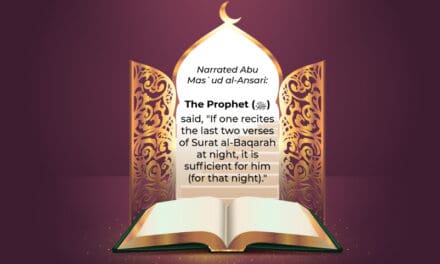Origins of Takbeer and Why Muslims Recite:
Prophet Ibrahim, may peace be upon him, had a dream. In this dream he was commanded by Allah subhana wa ta’ala to sacrifice his son Isma’il.
When he told his son about this dream, his son agreed that whatever Allah has ordained you must follow. They both agreed to submit to the will of Allah.
Ismail lay prostrate with his forehead touching the ground, while his father laid a sharp knife upon his neck.
Allah then called down right before Ibrahim (a) began moving the knife, “O Ibrahim! You have done my bidding and now you will be rewarded!”.
A large ram was brought as an alternative sacrifice, so instead of killing his son, Ibrahim slaughtered the sheep in the name of Allah.
The angels exclaimed: Allahu Akbar Allahu Akbar. Ibrahim heard the voice of the angels and said: “La Ilaha Illallahu Wallahu Akbar”
Isma’il heard this conversation and realized that God had relieved him from this great trial and so he said: “Allahu Akbar Wa Lillahil Hamd”
Allahu akbar allahu akbar la ilaha illallah takbeer in arabic
Here is the takbeer in Arabic text alongside transliteration and English translation.اللَّهُ أَكْبَرُ اللَّهُ أَكْبَرُ لَا إلَهَ إلَّا اللَّهُ وَاَللَّهُ أَكْبَرُ اللَّهُ أَكْبَرُ وَلِلَّهِ الْحَمْد
Transliteration: Allahu Akbar Allahu Akbar La Ilaha Ilallah Wallahu Akbar Allahu Akbar Wa Lillahil Hamd
Meaning: Allah is the greatest, Allah is the greatest. There is no deity (no god) besides Allah and Allah is the greatest. Allah is the greatest and to Allah all praises belong.
The benefit of Takbeer and When One Should Recite:
It is wajib (compulsory) for every adult Muslim to recite Takbeer Tashreeq audibly after fardh salat starting from Fajr of 9 Dhu al-Hijjah until after Asr of 13 Dhu al-Hijjah. It doesn’t matter if the salah was performed individually or in congregation. It should also be recited for Eid al adha salat.
Women are advised to recite silently.
There is great reward to reciting this in the first ten days of Dhu’l-Hijjah as these are venerated days. Allah swore by them in the Quran, this should tell us there is great benefit placed on these days.
“By the dawn [this is an oath from Allah. He has the right to swear by any object of His creation (i.e., the sun, the moon, the stars, the dawn, or the angels]; By the ten nights (i.e. the first ten days of the month of Dhul-Hijjah)” Surah Al-Fajr ayat 1-2
In the tafseer of Ibn Katheer, 8/413 it is written:
“Good deeds during these days are beloved to Allah, because the Prophet (ﷺ) said: “There are no days in which righteous deeds are more beloved to Allah than these ten days.” They said, “O Messenger of Allah, not even jihad for the sake of Allah?” The Messenger of Allah (ﷺ) said, “Not even jihad for the sake of Allah, except in the case of a man who went out to fight, giving himself and his wealth up for the cause, and came back with nothing.” Narrated by Al-Bukhari, 969; At-Tirmidhi, 757.”
The Prophet (ﷺ) said: “The days of Tashriq are the days of eating, drinking and remembrance of Allah.” Narrated by Muslim, hadith number 1141 (a) and 1141 (b).
And what better way to remember Allah then by reciting this takbeer (saying: Allahu Akbar = Allah’s the greatest) and tahleel (Laa ilaaha ill-Allaah = There is no deity (no god) besides Allah).





Actually, it was Abraham and God commanded him to sacrifice his only true son, Isaac. Ishmael was from a sinful act with his slave. An act that was against God’s will.
I seek refuge in Allah from slandering our father and great Prophet Ibrahim a true servant of our Creator who was beloved of and blessed by Allah. May Allah guide you.